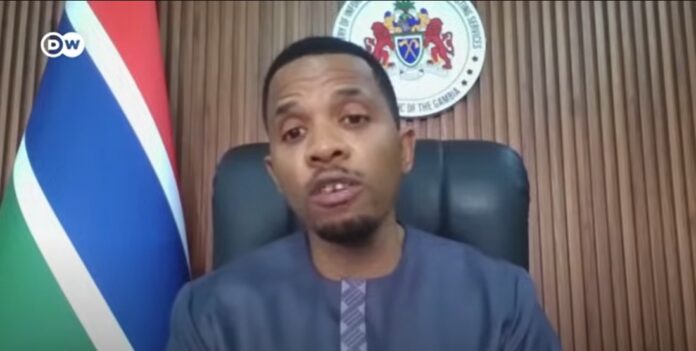Written by: Seringe S.T. Touray
Gambia’s Information Minister, Dr Ismaila Ceesay, defended President Adama Barrow’s human rights and governance record in a recent interview with DW Africa, saying “Gambians are happy with the president” and arguing the government has delivered key reforms after the country’s transition from rule under former president Yahya Jammeh.
Dr Ceesay highlighted the Truth, Reconciliation and Reparations Commission (TRRC) process, noting that the government accepted almost all of its more than 290 recommendations, which he claimed “fundamentally focus on building institutions that can provide accountability, transparency, and discourage impunity.”
He asserted that civil liberties have expanded significantly under Barrow, claiming there are “no human rights abuses,” “no arbitrary arrests,” “no torture chambers,” and that “journalists operate freely, even insulting the president and the government” without facing reprisals. He further described Barrow as “the most peaceful president the country has had,” adding that “the president had recently been recognised as the most peaceful president on the continent.”
During the programme, DW’s hosts challenged these assertions and cited examples documented by press freedom groups and local media. These included two journalists from The Voice newspaper arrested and charged with “false publication and broadcasting” in late September and early October 2024, a separate incident in March 2025 when the Information Ministry summoned The Voice’s editor over a corruption headline based on an Afrobarometer report, and the case of Alagie Bora Sisawo, a culture and society talk show co-host on Kerr Fatou’s platform. Sisawo’s bail was revoked on 4 October 2023, and he remained in custody until 10 October 2023 — beyond the 72-hour legal limit. In November 2023, the High Court ruled that his detention was unlawful and awarded him damages.
As another example from the media space, Momodou Sabally, then the United Democratic Party (UDP) campaign manager and a former GRTS director, was arrested on 22 December 2022 in connection with a video the police said incited unrest. At the time, he was a senior opposition figure. Since then, he has joined the ruling party and now works directly within the administration, serving as a Special Adviser to the President’s Office and more recently appointed Deputy National Campaign Manager of the National People’s Party (NPP) in April 2025. His detention during the holiday period drew criticism, with allegations of political motive, though authorities denied interference.
On protests, Ceesay argued that “public demonstrations must comply with the Public Order Act.” He said “police acted within the law when detaining protesters without a permit,” but added that “when permits were granted, such as in more recent demonstrations, nobody was arrested” and marches were “peaceful.”
In May 2025, police reported arresting at least 27 protesters and two journalists during a march in Banjul organised by Gambians Against Looted Assets (GALA). The group had applied for a permit to protest over the handling of former president Jammeh’s assets but was denied by the Inspector General of Police. They proceeded with the demonstration despite the denial, leading to the arrests. Lawmakers have since set up a special inquiry to review how those assets were disposed of after the Janneh Commission.
On the economy, Ceesay told DW Africa that “inflation had dropped from 17 percent last year to now 7.2 percent” under Barrow’s leadership. In reality, official figures show headline inflation was around 17% in 2023. By the end of 2024, it had already fallen to an annual average of 11.7%. The 7.2% figure he quoted is not the rate for a full year — it is the mid-year figure for June 2025. By skipping over 2024’s actual number and comparing 2023 directly with a single month in 2025, his statement makes the drop look much bigger and faster than it really was.
Ceesay also addressed the long-standing public grievance over Barrow’s continuation in office after three years, saying “it was a coalition pledge, not his personal promise.” He argued that “the coalition splintered after the election,” making the pledge unenforceable, and that “the president could not abandon ship” during what he described as a fragile national transition.
Civil society voices have pushed back on many of Ceesay’s claims. Madi Jobarteh, head of the Edward Francis Small Centre for Rights and Justice, published a detailed response to Ceesay’s also recent West Coast Radio “Coffee Time” interview, listing what he said were systemic governance failures. Several of his points are supported by public records. For example, the National Audit Office’s summarised audit of the 2017 government accounts reported withdrawals totalling D669 million from “Special Security” accounts without the Accountant General’s approval. The 2018 summarised report flagged procurement of eleven vehicles for the Office of the President where nine vehicles were delivered before the contract was signed.
Madi also referenced Parliament’s Finance and Public Accounts Committee findings. In July 2025, FPAC’s report on audited government accounts recorded, among other issues, about D474.4 million taken from the Contingency Fund for items that should have been in the regular budget and D62.5 million in cheques marked “cancelled” in the system but still withdrawn from bank accounts. These figures are reflected in official committee reports.
Separately, allegations of D300 million in missing revenues at the Gambia Ports Authority have been referred to the Ministry of Justice for advice, according to officials and local press.
Looking to the 2026 election, Ceesay said “Barrow deserves another term” and declared, “what he has done so far in eight years, no government could have done.” Supporters and critics will test those claims in the coming months, with scrutiny likely to focus on reforms, fiscal controls, press freedom, and the management of Jammeh-era assets.




